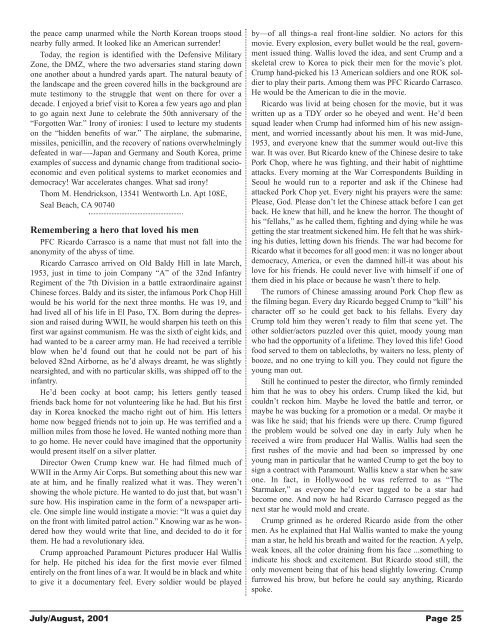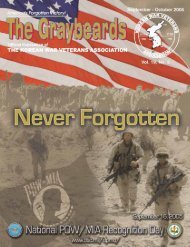The Graybeards - Korean War Veterans Association
The Graybeards - Korean War Veterans Association
The Graybeards - Korean War Veterans Association
You also want an ePaper? Increase the reach of your titles
YUMPU automatically turns print PDFs into web optimized ePapers that Google loves.
the peace camp unarmed while the North <strong>Korean</strong> troops stood<br />
nearby fully armed. It looked like an American surrender!<br />
Today, the region is identified with the Defensive Military<br />
Zone, the DMZ, where the two adversaries stand staring down<br />
one another about a hundred yards apart. <strong>The</strong> natural beauty of<br />
the landscape and the green covered hills in the background are<br />
mute testimony to the struggle that went on there for over a<br />
decade. I enjoyed a brief visit to Korea a few years ago and plan<br />
to go again next June to celebrate the 50th anniversary of the<br />
“Forgotten <strong>War</strong>.” Irony of ironies: I used to lecture my students<br />
on the “hidden benefits of war.” <strong>The</strong> airplane, the submarine,<br />
missiles, penicillin, and the recovery of nations overwhelmingly<br />
defeated in war—-Japan and Germany and South Korea, prime<br />
examples of success and dynamic change from traditional socioeconomic<br />
and even political systems to market economies and<br />
democracy! <strong>War</strong> accelerates changes. What sad irony!<br />
Thom M. Hendrickson, 13541 Wentworth Ln. Apt 108E,<br />
Seal Beach, CA 90740<br />
Remembering a hero that loved his men<br />
PFC Ricardo Carrasco is a name that must not fall into the<br />
anonymity of the abyss of time.<br />
Ricardo Carrasco arrived on Old Baldy Hill in late March,<br />
1953, just in time to join Company “A” of the 32nd Infantry<br />
Regiment of the 7th Division in a battle extraordinaire against<br />
Chinese forces. Baldy and its sister, the infamous Pork Chop Hill<br />
would be his world for the next three months. He was 19, and<br />
had lived all of his life in El Paso, TX. Born during the depression<br />
and raised during WWII, he would sharpen his teeth on this<br />
first war against communism. He was the sixth of eight kids, and<br />
had wanted to be a career army man. He had received a terrible<br />
blow when he’d found out that he could not be part of his<br />
beloved 82nd Airborne, as he’d always dreamt, he was slightly<br />
nearsighted, and with no particular skills, was shipped off to the<br />
infantry.<br />
He’d been cocky at boot camp; his letters gently teased<br />
friends back home for not volunteering like he had. But his first<br />
day in Korea knocked the macho right out of him. His letters<br />
home now begged friends not to join up. He was terrified and a<br />
million miles from those he loved. He wanted nothing more than<br />
to go home. He never could have imagined that the opportunity<br />
would present itself on a silver platter.<br />
Director Owen Crump knew war. He had filmed much of<br />
WWII in the Army Air Corps. But something about this new war<br />
ate at him, and he finally realized what it was. <strong>The</strong>y weren’t<br />
showing the whole picture. He wanted to do just that, but wasn’t<br />
sure how. His inspiration came in the form of a newspaper article.<br />
One simple line would instigate a movie: “It was a quiet day<br />
on the front with limited patrol action.” Knowing war as he wondered<br />
how they would write that line, and decided to do it for<br />
them. He had a revolutionary idea.<br />
Crump approached Paramount Pictures producer Hal Wallis<br />
for help. He pitched his idea for the first movie ever filmed<br />
entirely on the front lines of a war. It would be in black and white<br />
to give it a documentary feel. Every soldier would be played<br />
by—of all things-a real front-line soldier. No actors for this<br />
movie. Every explosion, every bullet would be the real, government<br />
issued thing. Wallis loved the idea, and sent Crump and a<br />
skeletal crew to Korea to pick their men for the movie’s plot.<br />
Crump hand-picked his 13 American soldiers and one ROK soldier<br />
to play their parts. Among them was PFC Ricardo Carrasco.<br />
He would be the American to die in the movie.<br />
Ricardo was livid at being chosen for the movie, but it was<br />
written up as a TDY order so he obeyed and went. He’d been<br />
squad leader when Crump had informed him of his new assignment,<br />
and worried incessantly about his men. It was mid-June,<br />
1953, and everyone knew that the summer would out-live this<br />
war. It was over. But Ricardo knew of the Chinese desire to take<br />
Pork Chop, where he was fighting, and their habit of nighttime<br />
attacks. Every morning at the <strong>War</strong> Correspondents Building in<br />
Seoul he would run to a reporter and ask if the Chinese had<br />
attacked Pork Chop yet. Every night his prayers were the same:<br />
Please, God. Please don’t let the Chinese attack before I can get<br />
back. He knew that hill, and he knew the horror. <strong>The</strong> thought of<br />
his “fellahs,” as he called them, fighting and dying while he was<br />
getting the star treatment sickened him. He felt that he was shirking<br />
his duties, letting down his friends. <strong>The</strong> war had become for<br />
Ricardo what it becomes for all good men: it was no longer about<br />
democracy, America, or even the damned hill-it was about his<br />
love for his friends. He could never live with himself if one of<br />
them died in his place or because he wasn’t there to help.<br />
<strong>The</strong> rumors of Chinese amassing around Pork Chop flew as<br />
the filming began. Every day Ricardo begged Crump to “kill” his<br />
character off so he could get back to his fellahs. Every day<br />
Crump told him they weren’t ready to film that scene yet. <strong>The</strong><br />
other soldier/actors puzzled over this quiet, moody young man<br />
who had the opportunity of a lifetime. <strong>The</strong>y loved this life! Good<br />
food served to them on tablecloths, by waiters no less, plenty of<br />
booze, and no one trying to kill you. <strong>The</strong>y could not figure the<br />
young man out.<br />
Still he continued to pester the director, who firmly reminded<br />
him that he was to obey his orders. Crump liked the kid, but<br />
couldn’t reckon him. Maybe he loved the battle and terror, or<br />
maybe he was bucking for a promotion or a medal. Or maybe it<br />
was like he said; that his friends were up there. Crump figured<br />
the problem would be solved one day in early July when he<br />
received a wire from producer Hal Wallis. Wallis had seen the<br />
first rushes of the movie and had been so impressed by one<br />
young man in particular that he wanted Crump to get the boy to<br />
sign a contract with Paramount. Wallis knew a star when he saw<br />
one. In fact, in Hollywood he was referred to as “<strong>The</strong><br />
Starmaker,” as everyone he’d ever tagged to be a star had<br />
become one. And now he had Ricardo Carrasco pegged as the<br />
next star he would mold and create.<br />
Crump grinned as he ordered Ricardo aside from the other<br />
men. As he explained that Hal Wallis wanted to make the young<br />
man a star, he held his breath and waited for the reaction. A yelp,<br />
weak knees, all the color draining from his face ...something to<br />
indicate his shock and excitement. But Ricardo stood still, the<br />
only movement being that of his head slightly lowering. Crump<br />
furrowed his brow, but before he could say anything, Ricardo<br />
spoke.<br />
July/August, 2001 Page 25

















